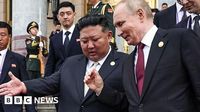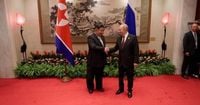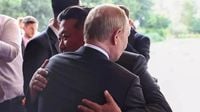In a move that has rattled the international community and set off a fresh wave of diplomatic ripples, Russian President Vladimir Putin publicly thanked North Korean leader Kim Jong Un for the “courage” of North Korean soldiers fighting alongside Russian forces in Ukraine. The rare display of solidarity unfolded on September 3, 2025, during a high-profile meeting in Beijing, where both leaders attended a massive military parade commemorating the 80th anniversary of the end of World War II in Asia, according to Sky News and the BBC.
The occasion marked Kim Jong Un’s first appearance at an international gathering of world leaders. The North Korean leader—typically isolated on the world stage—walked side by side with Putin and Chinese President Xi Jinping in Tiananmen Square, a moment that seemed designed to send a clear message to the West: Russia, North Korea, and China are forging closer ties in defiance of mounting Western pressure.
During their talks, Putin did not mince words when he acknowledged North Korea’s direct military involvement in the ongoing war in Ukraine. “Russia will never forget North Korea’s participation in the fight against modern neo-Nazism,” Putin declared, referencing the Kremlin’s longstanding narrative about the Ukrainian government. He added, “We will not forget the losses suffered by your armed forces and the families of your soldiers.” Kim, in turn, expressed gratitude for the recognition and pledged unwavering support. “If there is any way we can assist Russia, we will certainly do it as a fraternal duty,” Kim said, according to the BBC.
The scale of North Korea’s involvement has been the subject of intense scrutiny. South Korean intelligence estimates that North Korea has sent approximately 15,000 troops to aid Russia since October 2024, along with missiles and long-range weapons. These soldiers, many of whom reportedly lacked previous combat experience, initially underwent training in Russia before being deployed in support roles—and later, in direct combat, particularly in efforts to recapture parts of the western Kursk region. The BBC notes that these operations have come at a steep cost: Western officials reported at least 1,000 North Korean deaths within three months, while South Korean lawmakers later estimated 4,700 casualties, including 600 deaths, out of the 15,000 deployed.
North Korea itself has acknowledged losses, reporting 350 soldiers killed during the first and second stages of deployment. Yet, South Korean officials contend the real toll is far higher, with intelligence sources citing around 2,000 North Korean troops killed in combat. Undeterred, Pyongyang reportedly plans to send an additional 6,000 soldiers to Russia as part of a third deployment rotation, Sky News reported. North Korea has also promised to dispatch thousands of workers to help rebuild the war-ravaged Kursk region, a move that underscores the deepening economic and military cooperation between Moscow and Pyongyang.
The relationship between the two countries has been formalized through a strategic partnership pact signed in June 2024, pledging mutual assistance in the event of “aggression” against either country. Kim has described the treaty as the “strongest ever” between North Korea and Russia, and a few weeks before the Beijing meeting, he reaffirmed his “unconditional support” for Moscow’s war in Ukraine.
While the Moscow-Pyongyang axis has become more visible and assertive, the reaction from the West has been swift and, at times, sharply critical. U.S. President Donald Trump, never one to shy away from controversy, lambasted the Beijing meeting. On his Truth Social platform, Trump accused Putin, Xi, and Kim of “conspiring against the United States of America,” a charge the Kremlin dismissed as “ironic.” In a radio interview, Trump added, “I’m very disappointed in President Putin, I can say that. We had a great relationship, I’m very disappointed.” He also hinted at possible new sanctions against Russia if Putin fails to pursue peace with Ukraine, stating, “If we’re unhappy about it, you’ll see things happen.”
Meanwhile, Trump has sought to bolster U.S. support for Eastern European allies, offering to send more American troops to Poland during a meeting with Polish President Karol Nawrocki. “We’re with Poland all the way and we’ll help Poland protect itself,” Trump said, underscoring the shifting security dynamics in the region as the war drags on.
European leaders are also recalibrating their approach. French President Emmanuel Macron announced that Europe stands ready to offer security guarantees to Ukraine once a peace accord is signed. “We are ready for a robust peace and lasting peace for Ukraine and the Europeans,” Macron said during a meeting in Paris with Ukrainian President Volodymyr Zelenskyy. The so-called “coalition of the willing”—comprising about 30 countries—is set to meet in Paris to discuss long-term security arrangements for Ukraine.
Putin, for his part, signaled both a willingness to negotiate and a readiness to escalate. Speaking at the end of his Beijing visit, Putin said, “It seems to me that if common sense prevails, it will be possible to agree on an acceptable solution to end this conflict. That is my assumption. If not, then we will have to resolve all the tasks before us by force of arms.” He also indicated he was open to direct talks with Zelenskyy in Moscow, though Ukraine’s Foreign Minister Andrii Sybiha quickly dismissed Moscow as an “unacceptable” venue for such negotiations.
On the ground, the war’s humanitarian toll continues to mount. Ukraine claims more than 19,500 children have been taken to Russia or Russian-occupied territory during the conflict, a practice the International Criminal Court has labeled a war crime. The UK recently imposed new sanctions on Russian officials and youth organizations linked to the deportation and indoctrination of Ukrainian children, with Foreign Minister David Lammy condemning the Kremlin’s actions as “despicable.”
In a poignant moment last week, Kim Jong Un met with families of North Korean soldiers killed fighting for Russia, expressing “sorrow” at his failure to bring the soldiers back alive. He pledged to build a monument in their honor and to care for their children, a gesture that, while symbolic, underscores the personal and political costs of North Korea’s deepening involvement in the war.
As the conflict grinds on, the alignment between Moscow, Pyongyang, and Beijing has become a defining feature of the new geopolitical landscape—one that presents fresh challenges for Western policymakers and raises difficult questions about the future of the war in Ukraine and the stability of the broader region.



